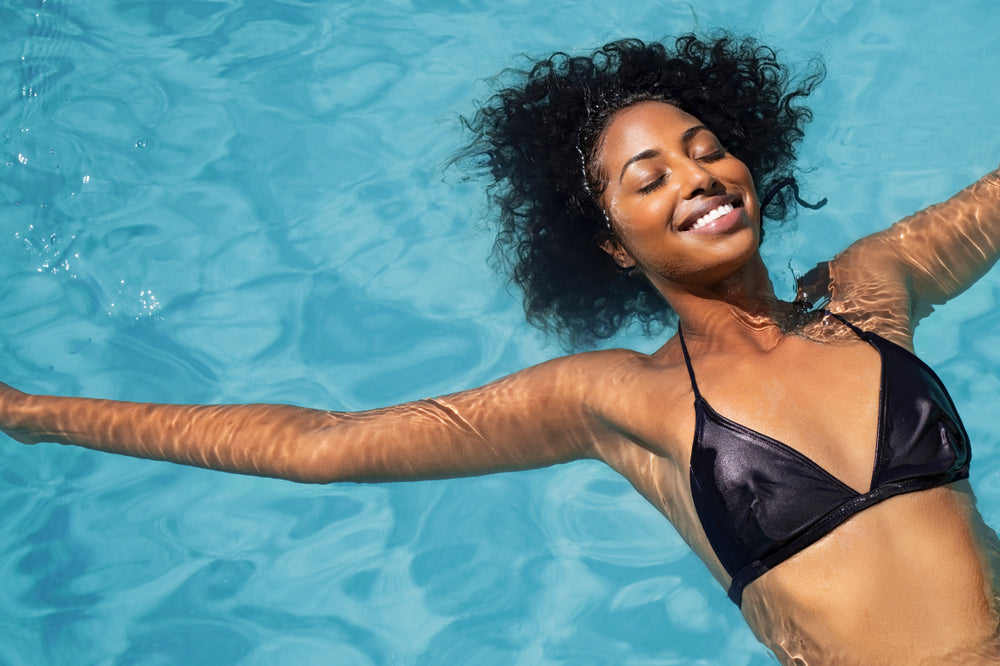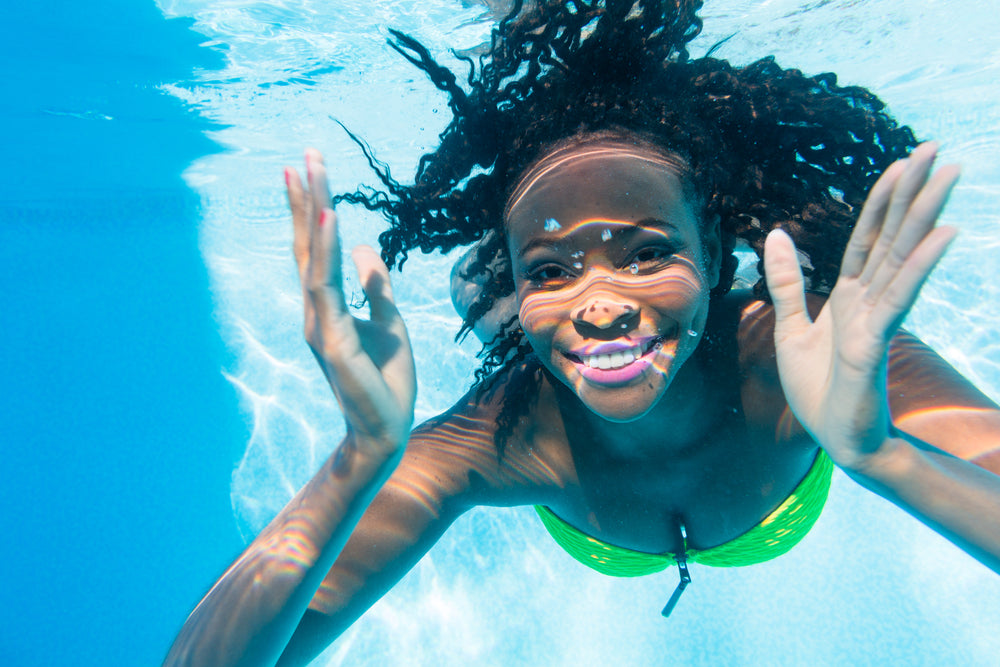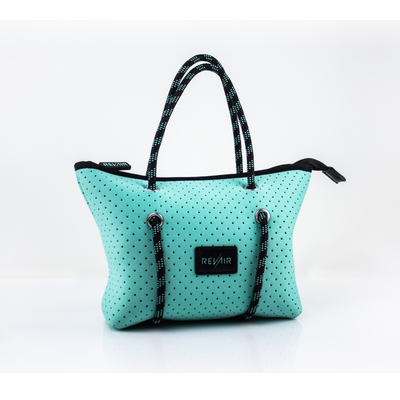
Summer Hair: 7 Ways To Prevent Swimmer's Hair

We all love the pool, and can't wait to hop in this summer. But there's one problem to think about: every time you take a dip, your hair takes a beating. The chlorine in swimming pools might be great for killing bacteria and keeping swimmers safe from disease, but it's harsh on hair and skin. So should you avoid swimming this summer? Of course not. There are ways you can protect your precious strands from the potential damage caused by chlorine. But before we get into that, let's explore how chlorine affects the hair and skin.
WHAT CHLORINE DOES TO THE HAIR AND SKIN
So why is chlorine so bad for the hair and skin but so great at killing bacteria and other pathogens? Read on.
WHAT IS CHLORINE?
Chlorine (Cl-) is an essential building block scientists use to make many products for public health and safety, (e.g. swimming pools, drinking water) advanced technology, nutrition, security, and transportation. Food, water, medicines, computers, and cell phones all depend on chlorine chemistry.
Chlorine is a nonmetal element on the periodic table that tends to bond with other elements like sodium (Na) to make table salt (NaCl). So if salt or other compounds like potassium or copper are found in pools, the chlorine will attach itself to them. The same goes for organic compounds like bacteria, so what does this have to do with swimming and protecting hair from chlorine? Let's find out.
THE EFFECTS OF CHLORINE ON THE HAIR AND SKIN
Because chlorine seems to want to bind to everything, it's also attracted to oils. And what do we know contains oils? Our hair, skin, and fingernails. An oil known as sebum coats the hair and the rest of the body. This helps the skin and hair retain moisture. Sebum is also important for the skin and hair because it contains vitamin E, an anti-aging antioxidant that promotes elasticity and lustrous skin and hair.
1. DRYNESS
When your hair comes in contact with chlorinated water, the chlorine bonds with the sebum in your hair. The chlorine then pulls sebum out by chemical bond. So chlorine strips the skin and hair of its natural oils. This makes for dry, brittle, and lackluster hair and skin.
2. SPLIT ENDS
If you continue to have dry hair and don't restore its moisture after your time in the pool, your hair may begin to split at the ends. If you don't cut off these split ends, they'll start to travel up the hair shaft.
As split ends travel up the hair shaft, they can damage the entire strands beyond repair. Split ends no longer have a smooth cuticle covering them, which causes them to naturally catch and snag on each other and healthy ends. This eventually leads to breakage because your hair is at a higher risk of becoming tangled. Plus, an open cuticle -- which when healthy, is supposed to be a protective outer layer -- leaves the inner core of proteins that make up your hair exposed. What you end up with is widespread damage throughout your hair.
3. WEAKENED PROTEINS
Sebum isn't the only part of your hair chlorine affects. It also affects the chemical makeup of your hair. When it comes in contact with the keratin protein in your hair, chlorine bonds with some of the molecules. As a result, they become water-soluble. This weakens the proteins in your hair, making them thinner, which in turn, makes your hair more prone to breakage.
4. ALTERED HAIR COLOR
Chlorine can also change the color of your hair. If it can make paper white and take the color out of flowers, then it can do the same to your hair. Over time, chlorine can bleach your hair. Remember how we said chlorine likes to bond to pretty much everything? Well, there's another thing it bonds to -- melanin, the natural pigment that gives hair its color. When chlorine binds to melanin, it leaves behind the keratin protein, which is naturally a dull blonde. This process is accelerated if you have color in your hair. That's because dyed hair has chemical treatments that -- you guessed it -- chlorine will readily bond to.
Chlorine can also change your hair's color in an indirect way. When copper is present in pool water, it combines with chlorine and water molecules to make copper(II) chloride dihydrate (CuCl2(H2O)2), a compound that's known for its blue-green color. So if copper is in your swimming pool, it can cause your hair to turn a pale green.

HOW TO PROTECT YOUR HAIR FROM CHLORINE
Now that you know what chlorine does, you might be wondering how to protect your hair from it. Well, if you enjoy swimming, you can't avoid chlorine. But here's how you can prevent saltwater hair and chlorine hair damage:
1. PRE-RINSE YOUR HAIR
Rinse your hair with water before taking a dip. And we don't mean a light rinse. We mean soak those strands. Why? Because wetting your hair with fresh, clean water before getting in the pool will help diminish the amount of chlorinated water your hair will soak up. This will minimize the amount of damage and dryness that could occur to your hair from chlorine or saltwater exposure.
2. APPLY SPF TO YOUR HAIR
You thought SPF is only for the skin? Nope. You can use it on your hair too. Like the skin, your hair needs protection from the sun. SPF also protects the hair from chemically treated water. Just make sure you're using SPF that's made specifically for hair, as regular sunscreen is too greasy for the hair, and can weigh it down.
3. APPLY A HAIR MASK BEFORE SWIMMING
Slather a generous amount of conditioner or intensive moisturizer to coat your hair strands with a protective barrier against the chlorinated water. For an extra layer of protection, you can use a pre-swim in-hair defense like AquaGuard. Be sure to apply it to your ends, as they're most prone to damage from the chlorine.
4. USE A SWIM CAP
While a swim cap may not be the most fashion-forward look, it's probably the best way to protect hair from chlorine. If you don't want to wear a swim cap, then try to keep your head and hair out of the water as much as possible. You can also put your hair in a ponytail, braid, or topknot to protect your stands from chlorine.
5. RINSE YOUR HAIR AFTER SWIMMING
After you're done swimming, make sure you rinse your hair ASAP. You don't want the chlorine that did get on your strands to stay there for too long. That's what those outdoor showers at your local pool or beach are for. They provide you with a quick way to wash off the chlorine so that you don't have to wait until you get home.
6. CLARIFY AND CONDITION
When you get home from the pool, be sure to shampoo your hair right away. The sooner you clarify your hair, the more chlorine you'll be able to get rid of. You can also use a shampoo specially designed for swimmers for more cleaning power. But be careful with shampoos; you don't want to further strip your hair of oils, as the chlorine likely already did that. So try using a sulfate-free, moisturizing shampoo. After shampooing, apply conditioner to replenish any lost moisture.
Swimming can be taxing on the hair. So don't think washing and conditioning it will be enough to bring your hair back to life. You should take an extra step -- deep conditioning. Let the conditioner penetrate those strands for 20-30 minutes using either a hair towel/turban or a plastic cap. This will give you an extra dose of moisture that's long-lasting. Once you rinse out the deep conditioner, follow with a leave-in conditioner to seal in the moisture.
7. RESTORE LOST MOISTURE
Did you think you were done? At this point, after a dip in the pool, more is more when it comes to moisturizer. After applying a leave-in, lather your hair in a rich oil like argon or coconut to prevent your hair from losing the moisture you added to it with conditioner.

WHAT IF THE DAMAGE IS ALREADY DONE?
Maybe your hair is already damaged by chlorine. Unfortunately, you can't reverse the damage, but you can soften the blow.
- If you notice split ends, be sure to get them trimmed. This will prevent them from traveling up the hair shaft and creating even more damage.
- Deep condition your hair regularly to maintain moisture.
- You should also consider using a protein treatment to strengthen the protein bonds in your hair.
- And don't forget about your scalp. A severely dry scalp can damage your hair follicles, so make sure you're keeping your scalp moisturized.
- And lastly, consult with your stylist about the best way to restore your hair to its original condition.
At the end of the day, swimmers' hair is not cute. So make sure you're doing everything you can to prevent chlorine hair damage. After all, who wants chlorine hair that's dull and lifeless? Not us!
Contact us today to learn more about caring forf your beautiful locks. We're always looking to help!

















